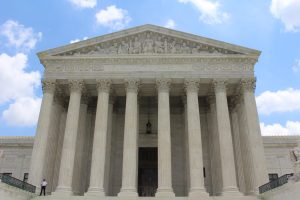By Sarah Whites-Koditschek
The U.S. Supreme Court this fall will take up a case about Alabama’s troubled handling of unemployment claims during the pandemic.
The high court scheduled oral arguments in the case for Monday, Oct. 7.
“Petitioners have experienced lengthy delays in receiving unemployment compensation benefits they believe they are owed,” the plaintiffs said in their petition for certiorari to the court.
A group of Alabamians sued in state court in 2022, arguing they were wrongly denied unemployment benefits and appeal opportunities during the COVID-19 pandemic. As a backlog of cases stacked up, Gov. Kay Ivey in 2022 called it “outrageous”.
In their lawsuit, the group argued the system was excessively delayed. Some people who did receive benefits later got notices from the department demanding repayment, sometimes thousands of dollars, without access to appeal.
The Alabama Department of Labor declined to comment for this story because of ongoing litigation.
In June of 2023, the Alabama Supreme Court ruled in favor of the Labor Department and Secretary Fitzgerald Washington, finding that the plaintiffs had to go through the full administrative appeals process before filing a lawsuit.
The department argued that Alabamians who had problems with their unemployment should seek appeals, “not by bringing this collateral suit to skip the line.”
Alabama’s appeals were backlogged by several years. According to an analysis of federal data by The Century Foundation. In 2021, Alabama had the greatest delays of any state. The average wait time for an appeal was 566 days. At that time, some states were hearing appeals within 20 days.
“It just seems so nonsensical,” said Larry Gardella, attorney for Legal Services Alabama which filed the lawsuit.
“They take forever to make a decision, (and) you have to wait for them to make a decision before you can challenge the decision?”
The U.S. Supreme Court will now weigh in. Gardella said he expects the court will rule on the issue by next summer.
In October, the high court will hear arguments from both sides about whether states are required to follow a reconstruction-era law that provides protections for citizens who feel their rights have been violated or whether such claims must exclusively be made through federal courts.
“Fundamental to our federal system is the fact that state courts as well as federal courts are entrusted with providing a forum for the vindication of federal rights violated by state or local officials acting under color of state law,” Legal Services of Alabama stated in its petition for certiorari filed in August of 2023.
In its filing before the U.S. Supreme Court, the Alabama Department of Labor noted that between April of 2020 and March of 2022, the state received almost one and a half million unemployment claims, one million of which were COVID related. The department was short-staffed, it said, which amounted to inevitable delays.
The state argued that state courts have freedom to decide when they are obligated to intervene in a case against state agency and that plaintiffs still have access to federal courts.
“There will be little practical difference for… plaintiffs whether they are allowed to skip past administrative law judges and head straight to state courts or whether they must follow the state law.”
Gardella, attorney for Legal Services, said having access to state courts for such claims increases the breath of options for addressing civil rights violations.
Aaron Johnson, 68, is one of 26 plaintiffs in the case. He lost his job with the U.S. Census Bureau in 2020, according to the complaint, and tried to get unemployment in October of that year. By January of 2022, no decision had been made on his application, even after he called multiple times to follow up.
Christin Burnett lost her job in 2019 and tried to get unemployment. According to the complaint, she was approved and received funds until 2020. But she was not able to get help during the pandemic because of a data error involving her social security number, and because she lost her job before COVID.
“Ms. Burnett is unable to find new employment because of COVID. She is waiting for (the department) to acknowledge her hearing request and schedule a hearing,” the lawsuit said.
In its response to the original suit, the department acknowledged that staffing shortages slowed the processing of claims. It said it was doing all it could to improve.
“The Department is now entering in appeals received in early December 2020,” said Thomas Daniel, director of Unemployment Compensation, in an affidavit in the suit in March of 2022. “Given the current backlog, it is impossible to provide a hearing date for all claimants within 90 days — even if ordered by the court.”
Sixteen states filed a brief in support of Alabama’s right to reject the lawsuit.
The Chamber of Commerce of the United States field a brief in support of the rights of individuals to sue in state court before exhausting administrative processes. The chamber said the obligation to file such claims in federal court is costly.
If you purchase a product or register for an account through a link on our site, we may receive compensation. By using this site, you consent to our User Agreement and agree that your clicks, interactions, and personal information may be collected, recorded, and/or stored by us and social media and other third-party partners in accordance with our Privacy Policy.











